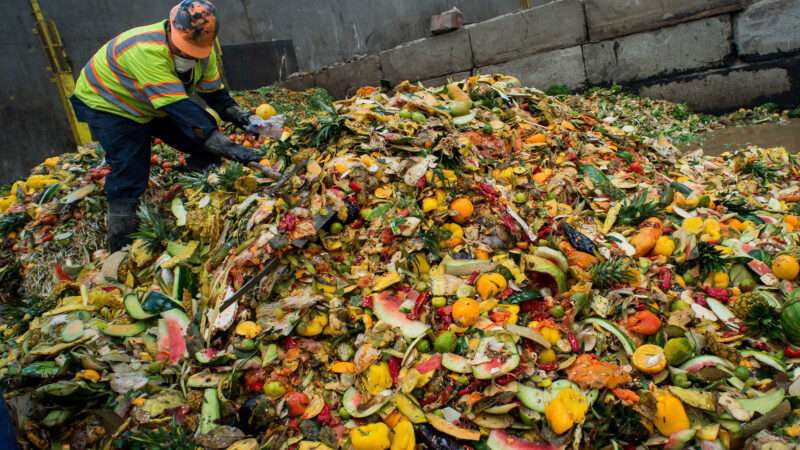
A California law that took effect this year and that was supposed to help the environment while combating hunger is instead causing chaos for food banks, businesses, and small cities and towns throughout the state.
The law, S.B. 1383, which took effect in January, "requires supermarkets and other big food providers to divert as much as a quarter of edible food now destined for dumps to food banks to feed the needy," the Los Angeles Times reported in December. "It tasks cities and counties with formulating local plans, with a statewide goal of recovering 20% of edible food by 2025," Reuters reported earlier this month. S.B. 1383 is the nation's first statewide law to require businesses to donate excess food to be eaten by hungry people. Compliance requirements, which will ultimately include fines, are being phased in. "First, large grocery stores and food wholesalers; later, restaurants and cafeterias will have to comply or face fines," ABC7 reported last week.
In addition to fighting hunger, the law was also intended to combat food waste—which has an outsized contribution to greenhouse gas emissions, as food sent to landfills belches methane, a far more potent greenhouse gas than carbon dioxide. The massive scale of food waste is an enormous problem. As I detail in my book Biting the Hands that Feed Us: How Fewer, Smarter Laws Would Make Our Food System More Sustainable, nearly 40 percent of all our food—roughly 40 million tons of it—goes to waste in the field, during processing, in transit, at the store, and/or on the plate. The value of that lost food totals more than $165 billion every year. Ten percent of the money Americans spend on food goes to waste. The environmental costs of that waste are colossal. Food waste is the third-leading contributor to atmospheric greenhouse gasses. And food that's wasted still uses the same inputs to grow—water, fertilizer, pesticides, fuel, wages—as food that's eaten. "Those resources are all used up whether a food is eaten or is left to rot in a field or landfill," I note in the book.
Giddy supporters have been busy touting the upside of California law. "This will reduce food waste and address food insecurity for millions of people," Alhambra Mayor Sasha Renée Pérez tweeted earlier this year. "California leads again!" Last month, San Diego's CBS affiliate reported the law had caused a dramatic jump in food donations there, calling the law "great news" because it means "more food going to residents of San Diego that might otherwise go hungry [and] that food won't have the opportunity to rot in a landfill and emit harmful greenhouse gasses in the process."
Yet multiple reports now highlight the fact that complying with the law is "proving easier said than done," ABC7 in Los Angeles reports. That's because grocers, restaurants, food banks, local governments, and others haven't "figure[d] out who is responsible for reclaiming [food] leftovers [under the law], and how to pay the costs of doing so." Those costs have only skyrocketed due to record gas prices. Given these challenges, it's "been hard for local food banks and small towns to implement [the law] due to climbing fuel costs and uncertainty over who pays for food recovery," Reuters notes.
While record fuel costs may have been difficult to predict, other cost increases had been expected under the law. "A survey by the League of California Cities found that most local governments expect refuse collection rates to increase less than 20%, with 1 in 5 cities saying they expect charges to go up more," the L.A. Times explained last year in a piece on the new law, which also contains requirements for setting aside compostable food waste at home. "Costa Mesa, an early adopter of curbside green recycling, estimates that over nine years, monthly rates will have risen a total of $6.10, to $24.10 a month, by 2023-24."
Despite rumors to the contrary, there are few barriers in place for businesses that want to donate leftover food to people in need and the organizations that aid them. The Bill Emerson Good Samaritan Act, signed into law by Pres. Bill Clinton more than 25 years ago, protects charitable individual and commercial food donors from most civil and criminal liability.
Mandatory government rules for reducing or eliminating food waste ignore the fact that the government bears a great deal of responsibility for creating food waste in the first place: like the federally-backed industry group that sets tart cherry quotas, forcing farmers whose crops exceed the quota to trash the supposedly excess amount; or the terrible waste management contract Oakland signed in 2015 that made it cheaper for restaurants to throw food away rather than compost it.
I bet California lawmakers meant well in passing the measure to combat food waste and hunger, but before they crafted yet another law that looks to be hurting the little guy—food banks, struggling businesses, small cities and towns in California, and people in need, in this case—they might've explored and addressed ways government itself causes or contributes to those same problems.
The post California's New Food Waste Law Is Backfiring appeared first on Reason.com.







